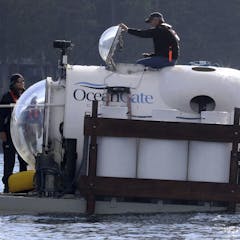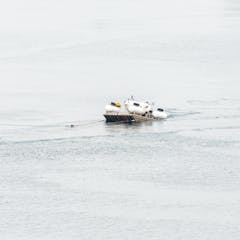
Articles on Titanic
Displaying 1 - 20 of 26 articles

Humour plays a role in our collective memory of historical events, especially disasters. Public reactions to the Titan’s implosion were reminiscent of comments that followed the sinking of the Titanic.

The recent tragedy of the Titan submersible bore striking parallels to one of the most widely read novels about life at sea.

Complex endeavours require complex risk management, and high-reliability organizations recognize this. OceanGate did not plan for the complexity of its operations, with tragic consequences.

Icebergs don’t just pose a risk to ships – they have a profound impact on the natural world and human societies.

The recent tragedy was an outlier; deep-diving submersibles have an outstanding safety record.

The Titan submersible implosion shares similarities with two other historic disasters: the Titanic and the Terra Nova Expedition to the South Pole.

Advances in technology have allowed tourists to go to places and do things they couldn’t in the past. But in extreme environments, the consequences of failure are high.

Not only do risky activities make people feel euphoric, they also convey status. But should there be limits on what tourists can do?

What makes billionaires risk their lives to see the Titanic wreck?

Most submersible designers would elect to have a classification society certify a vessel’s design. OceanGate made the conscious decision to refuse to do this for the Titan.

A team of rescuers has located debris from the Titan, indicating the end of search-and-rescue efforts. Risky undertakings need to assess the cost and capacity of any potential rescue needs.

An expert explains some of the best and worst case scenarios facing the missing commercial watercraft.

In 1997 we were all swept up in the romantic tale – but the film doesn’t stand up to scrutiny today.

25 years on from the release of James Cameron’s epic, Titanic, a film expert reflects on how the late-Nineties blockbuster explored the anxieties of the new Millennium.

Between zero and 2,000 icebergs reach Newfoundland each spring, but the warming climate could see an end to Iceberg Alley.

The film based on Walter Lord’s 1955 account is much more accurate than James Cameron’s epic.

Oceanographer Robert D. Ballard, who is best known for finding the wreck of Titanic, has written a memoir recounting his biggest discoveries and calling for more ocean exploration.

A recent ruling allowing a new expedition to the Titanic wreck gives the go ahead to commercial exploitation.

When the USSR launched the world’s first satellite, Sputnik 1 didn’t do much other than regularly “beep” over the radio. Yet, this simple sound is associated with the beginnings of space exploration.

Disney says the Marvel movie just beat ‘Avatar’ as the top-grossing movie of all time. Inflation tells a different story, as an economist explains.
